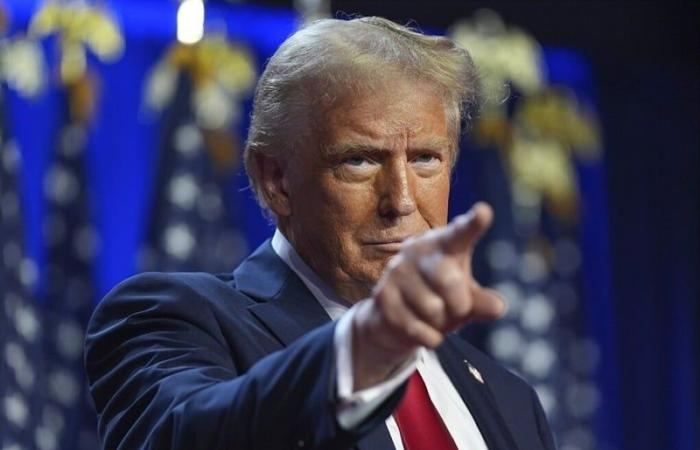This Wednesday, Donald Trump announced “ a political victory never seen before » in the United States, after its resounding success during the 2024 American presidential election. In this unprecedented context, Hespress FR asked Mustapha Tossa, political analyst, to decipher the implications of this unexpected success, particularly in the Middle East and in the sensitive issue of the Moroccan Sahara.
For Mustapha Tossa, “ it’s a massive victory for Donald Trump », which comforts the Republican candidate despite intense adversity. Facing Kamala Harris, Trump was able to reverse predictions by mobilizing a large electorate, consolidating his position in Congress and winning the popular vote. This election, underlines Tossa, marks “ the return of a man who many thought was finished, but who seems to benefit from a form of ‘baraka’“. According to him, Trump even escapes “ to an assassination attempt », which reinforces the aura of luck and protection on which he boasts.
Despite a polarized campaign where public opinion seemed to mobilize against Trump, American electoral logic ultimately worked in his favor, allowing the Republican to win both the popular vote and the Congress. “ The whole question is what will he do with this power for these four years? », Adds Tossa, pointing out the political challenges awaiting the Trump administration.
On the international level, Trump promised, during his campaign, to preserve the economic and security interests of American citizens, particularly in the face of migratory flows from Latin America. For Tossa, one of Trump’s priorities will undoubtedly be to realize his commitments to the American middle class, a segment that he himself describes as “ threatened in its status and purchasing power ».
As for foreign policy issues, Tossa emphasizes that Trump has displayed a strong stance regarding the conflict between Russia and Ukraine. “ During his campaign, he claimed he had the secret recipe to stop this war in 48 hours », recalls Tossa. This commitment opens a period of uncertainty in Europe, where leaders are hanging on Trump’s decisions. “ Europe hangs on his lips », Underlines the expert, highlighting international anticipation regarding this president whose choices influence geopolitical balances.
Morocco’s ally and recognition of the Moroccan Sahara
On the Maghreb front, Tossa recalls that Trump has always presented himself as a “ great friend of Morocco “. It was during his mandate as 45th President of the United States that he officially recognized Morocco’s sovereignty over the Sahara, a decision which triggered an international dynamic favorable to the Moroccan position.
This commitment to Morocco is set to strengthen, and “all the dynamics that followed, whether European, African or otherwise, consolidated the ties between the United States and Morocco“, he specifies. The analyst, however, questions the concrete measures that Trump could adopt to support his North African ally as part of an overall policy focused on stability in the Maghreb.
At the same time, the issue of the Middle East, and in particular the Israeli-Palestinian conflict, remains a sensitive issue for the Trump administration. During his campaign, the president-elect made pledges to Israeli Prime Minister Benjamin Netanyahu, suggesting increased American support for Israeli policies.
However, Tossa recalls that this displayed support could be qualified once Trump returns to the White House: “ What was said during the campaign may be something else during the exercise of power “, he indicates, saying he sees the possibility that Trump, by exerting pressure on Netanyahu, decides to act for a lasting ceasefire in the region.
For the analyst, the complexity of this Israeli-Palestinian crisis could lead Trump to rethink the traditional American position in favor of a two-state solution, although this option seems increasingly remote in the current context. “ Are the Israeli claims of geographical domination over Lebanon and Gaza still relevant? » asks Tossa, anticipating the diplomatic dilemmas Trump will face. According to him, the will to stop this war exists, but the central question remains to know at what price and with what compromises.
A heavy defeat for Kamala Harris
On the Democratic side, Kamala Harris’s failure against Trump can be explained by several factors. For Tossa, Harris suffered from the mistakes of her predecessor Joe Biden and a late transition of candidacy: “ She paid for Joe Biden’s record, for Joe Biden’s hesitations “, he explains, recalling the long months of uncertainty during which Americans questioned Biden’s ability to govern. Harris was unable to break free from Biden’s shadow, and did not have time to gather the support needed for a dynamic campaign.
An emblematic case of this disaffection is that of the Arab vote in key states like Michigan. According to Tossa, “ certain influential figures in the Arab-American community openly chose to vote for Trump, in a logic of sanctioning the governance of Biden-Harris “. For this segment of the electorate, the Democrats’ inability to act effectively in the Middle East context has reinforced their support for Trump, who seems, in the eyes of many, more capable of addressing their concerns.
Finally, Tossa notes a weighty element in the 2024 campaign: the involvement of Elon Musk, mogul of American technology and industry. “ Musk, with all his influence and financial support, has been a strong ally for Trump “, he maintains.
For him, Musk’s ability to mobilize his resources, whether financial or media, contributed to overturning perceptions about Trump, and the Republican candidate was able to transform the smear campaigns into a mobilization of his base, resolutely loyal despite the controversies.






